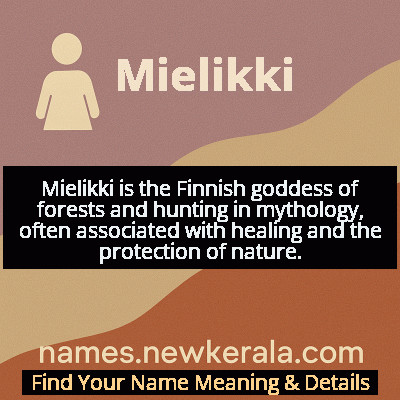Mielikki Name Meaning & Details
Origin, Popularity, Numerology Analysis & Name Meaning of Mielikki
Discover the origin, meaning, and cultural significance of the name MIELIKKI. Delve into its historical roots and explore the lasting impact it has had on communities and traditions.
Name
Mielikki
Gender
Female
Origin
Finnish
Lucky Number
7
Meaning of the Name - Mielikki
Mielikki is the Finnish goddess of forests and hunting in mythology, often associated with healing and the protection of nature.
Mielikki - Complete Numerology Analysis
Your Numerology Number
Based on Pythagorean Numerology System
Ruling Planet
Neptune (Ketu)
Positive Nature
Intuitive, analytical, spiritual, and inquisitive.
Negative Traits
Secretive, reserved, aloof, and can be overly critical.
Lucky Colours
Green, yellow.
Lucky Days
Monday.
Lucky Stones
Cat’s eye, moonstone.
Harmony Numbers
1, 5, 6.
Best Suited Professions
Scientists, researchers, spiritual leaders, detectives.
What People Like About You
Depth of knowledge, analytical skills, spirituality.
Famous People Named Mielikki
Mielikki Kaski
Poet and Writer
Award-winning Finnish poet known for nature-inspired works
Mielikki Sipilä
Environmental Activist
Founder of Finnish forest conservation organization
Mielikki Järvinen
Folk Musician
Traditional kantele player preserving Finnish musical heritage
Name Variations & International Equivalents
Click on blue names to explore their detailed meanings. Gray names with will be available soon.
Cultural & Historical Significance
In traditional Finnish folk beliefs, Mielikki was considered the ultimate healer who knew the medicinal properties of all plants and could cure any wound or illness. Farmers and hunters would leave offerings at forest shrines to honor her, and her blessing was sought for successful harvests and hunts. The name embodies the deep connection Finns have with their natural environment, particularly the mystical boreal forests that cover much of the country. During the Finnish National Romantic period in the 19th century, Mielikki's symbolism was revived as part of the movement to establish a distinct Finnish cultural identity separate from Swedish and Russian influences.
Extended Personality Analysis
Individuals named Mielikki are often characterized by their gentle strength, deep empathy, and strong connection to nature. They typically possess an intuitive understanding of others' emotions and a calming presence that makes people feel comfortable and understood. Like their mythological namesake, Mielikkis tend to be protective of those they care about and have a nurturing quality that draws people to them. They often exhibit remarkable patience and perseverance, able to navigate challenges with grace and determination.
Mielikkis frequently demonstrate creativity and artistic talent, particularly in areas connected to nature, music, or healing arts. They value authenticity and depth in relationships, preferring meaningful connections over superficial interactions. While generally peaceful, they can display fierce protectiveness when their loved ones or principles are threatened. Their inner strength often surprises others, as it contrasts with their typically gentle exterior. Many Mielikkis develop strong interests in environmental conservation, holistic health, or artistic expression as outlets for their deep-feeling nature. They often serve as peacemakers in conflicts and have a special affinity for animals and children, who seem naturally drawn to their calming energy.
Modern Usage & Popularity
Mielikki remains a distinctive and meaningful choice in modern Finland, though it's not among the most common names. According to the Finnish Population Register Centre, approximately 1,200 women currently bear this name, with a slight increase in usage noted over the past decade. The name enjoys particular popularity among families with strong connections to nature, environmental awareness, or interest in Finnish mythology and cultural heritage. Internationally, Mielikki has gained some recognition through fantasy literature and gaming communities, particularly among enthusiasts of Norse and Finnish mythology. The name's appeal lies in its beautiful sound, deep cultural roots, and positive meaning, making it an attractive option for parents seeking a name that is both traditional and unique. While still relatively rare outside Finland, it occasionally appears in Scandinavian countries and among diaspora communities, often chosen by parents who appreciate its ecological and mythological significance in an era of increasing environmental awareness.
Symbolic & Spiritual Meanings
Symbolically, Mielikki represents the harmonious relationship between humanity and nature, embodying the concept of stewardship and respectful coexistence with the natural world. The name carries connotations of healing, protection, and nurturing – qualities associated with both the forest environment and maternal care. In metaphorical terms, Mielikki symbolizes the 'heart of the forest' – the life force that sustains ecosystems and the spiritual connection humans feel to wild places. The name also represents hidden wisdom and intuitive knowledge, much like the secret healing properties of forest plants known only to those who study them deeply. In contemporary contexts, Mielikki has become symbolic of ecological awareness and the preservation of traditional knowledge about natural medicines and sustainable living. The name serves as a powerful reminder that true strength combines compassion with protection, and that our deepest wisdom often comes from listening to the natural world rather than dominating it.

